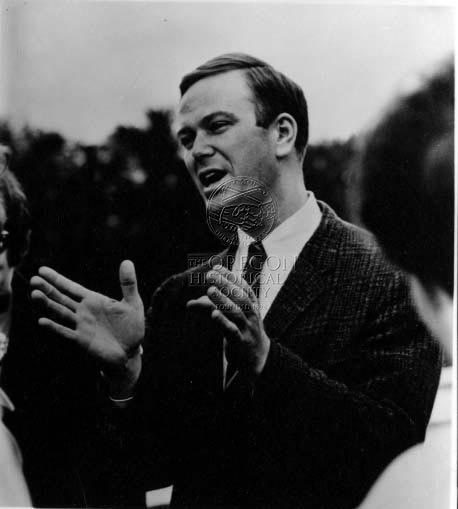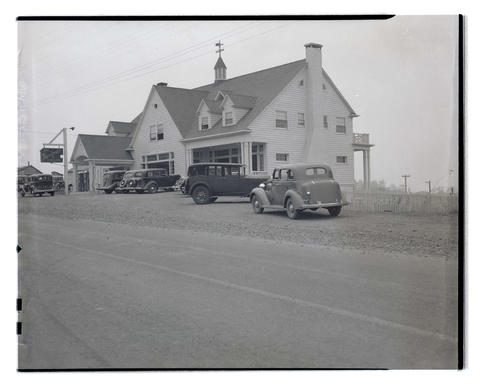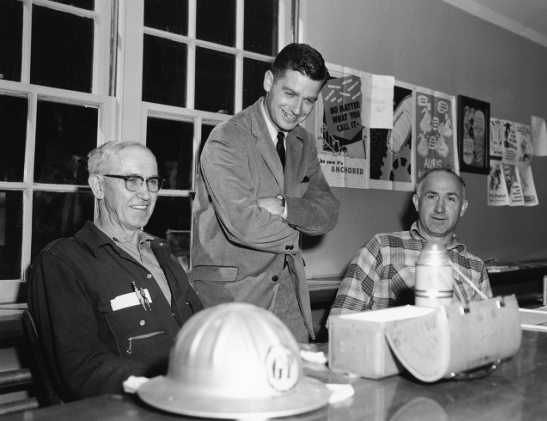Robert William "Bob" Packwood, a prominent United States Senator for twenty-six years, was born in Portland in 1932. He attended the California Institute of Technology for a few months before transferring to Willamette University, where he graduated in 1954 with a degree in political science.
During his undergraduate years, Packwood participated in Young Republican activities and worked on political campaigns, including Mark Hatfield's first run for the Oregon legislature. He received the prestigious Root-Tilden Scholarship to New York University Law School, where he earned national awards in moot court competition and was elected student body president. Packwood’s time in New York gave him a taste of East Coast politics and reinforced his intention to seek public office. He returned to Oregon to practice law in Portland but quickly turned to a political career.
In 1962, after an intense and innovative campaign staffed by an abundance of volunteers, Packwood was elected to the Oregon legislature. Because of the effectiveness of his own campaigns, Packwood was selected to play a key role on behalf of the Republican Party in the 1964 elections, when fifteen of the nineteen candidates he had recruited and trained won legislative seats. After Barry Goldwater's defeat in the 1964 presidential election, Packwood wanted to distance himself and the Oregon Republican Party from Goldwater's conservative ideas. In defiance of the party leadership, he founded the annual Dorchester Conference in Lincoln City, where progressive Republicans gathered to share ideas and develop strategies.
During his time in the legislature, Packwood became convinced that the legislative election system needed reform. At the time, a given county had a prescribed number of legislative seats. All candidates competed in the same election, and the four candidates receiving the most votes won the four seats. As chair of the House Local Government and Elections Committee, Packwood led the battle for single-member districts, in which candidates would run against each other for a specific seat. Oregon adopted the system after he left the legislature.
In 1968, Packwood defeated the incumbent Wayne Morse for a seat in the U.S. Senate, even though Senator Mark Hatfield crossed party lines to support Morse. Early in his Senate years, Packwood served on the Banking and Housing and the Labor and Public Works committees. He chaired the Commerce Committee from 1981 until 1985 and the Finance Committee during the Republican ascendancy, from 1985 through 1987, and briefly again in 1995.
When President Ronald Reagan proposed a major reform of the tax code in 1984, Packwood's initial response was "I sort of like the tax code the way it is." Nevertheless, along with Democratic Congressman Dan Rostenkowski, he played a leading role in fashioning "a radically new tax code that will raise business taxes by some $120 billion over five years—and lower personal income taxes by roughly the same amount."
Packwood nimbly walked the line between Oregon's timber industry and the state's strong environmental movement. He promoted legislation that favored his constituents in the business community while playing an active role in the creation of the Hells Canyon National Wilderness Area on the Oregon-Idaho state line.
In defiance of his party, Packwood was an early and ardent advocate for abortion rights, and he enjoyed broad support from the women's rights movement. After the Roe v. Wade decision in 1973, he opposed President Reagan's nomination of Robert Bork to the Supreme Court because of Bork's intention to overturn the ruling. He later unsuccessfully opposed the nomination of Clarence Thomas for the same reason.
Packwood early demonstrated his contrarian bent when, as a new senator, he questioned the seniority system that later was to benefit him and Oregon. Despite the party's position on the issue and the preferences of Oregon's Republican voters, he consistently supported gun control. Packwood was also among the first Republican senators to call for President Richard Nixon's resignation in 1974. Nevertheless, as had been the case in Oregon, Packwood's skills and experience made the party call on him to serve as the chair of the National Republican Senatorial Committee from 1977 to 1979 and from 1981 to 1983.
In 1992, the Washington Post published a series of articles chronicling accusations against Packwood of sexual harassment. He fought the charges, but more women came forward to make the same claims. After three years of controversy, the Senate Ethics Committee recommended his expulsion. Packwood resigned from the Senate on October 1, 1995.
-
![Warren K. Leffler, photographer]()
Senator Bob Packwood, 1977..
Warren K. Leffler, photographer Courtesy Library of Congress Prints and Photographs Division
-
![]()
Robert Packwood, U.S. Senator from Oregon, 1968.
Oregon Historical Society Oregon Journal Collection 013450
Related Entries
-
![Dorchester Conference]()
Dorchester Conference
The Dorchester Conference, launched in 1965 at the Dorchester House in …
-
![Mark O. Hatfield (1922-2011)]()
Mark O. Hatfield (1922-2011)
As an Oregon legislator, secretary of state, governor, and United State…
Map This on the Oregon History WayFinder
The Oregon History Wayfinder is an interactive map that identifies significant places, people, and events in Oregon history.
Further Reading
"The Packwood Paper," Senator Packwood's constituent newsletter, June 1969 through April 1975
"Washington's Odd Couple Shakes Up Taxes," Fortune, January 5, 1987.
Mark Kirchmeier, Packwood: The Public and Private Life from Acclaim to Outrage. New York: Harper Collins West, 1995.
Senate Ethics Counsel, The Packwood Report, September 7, 1995.




